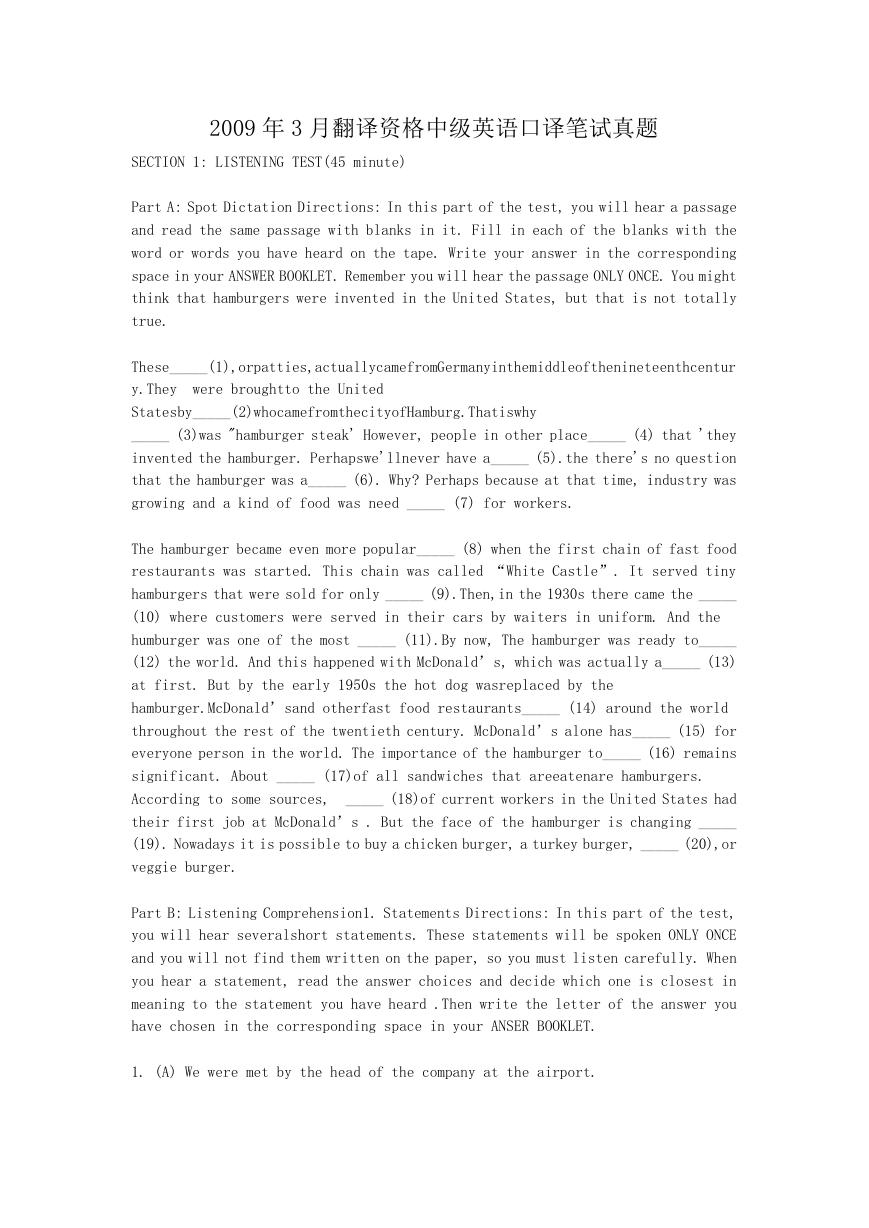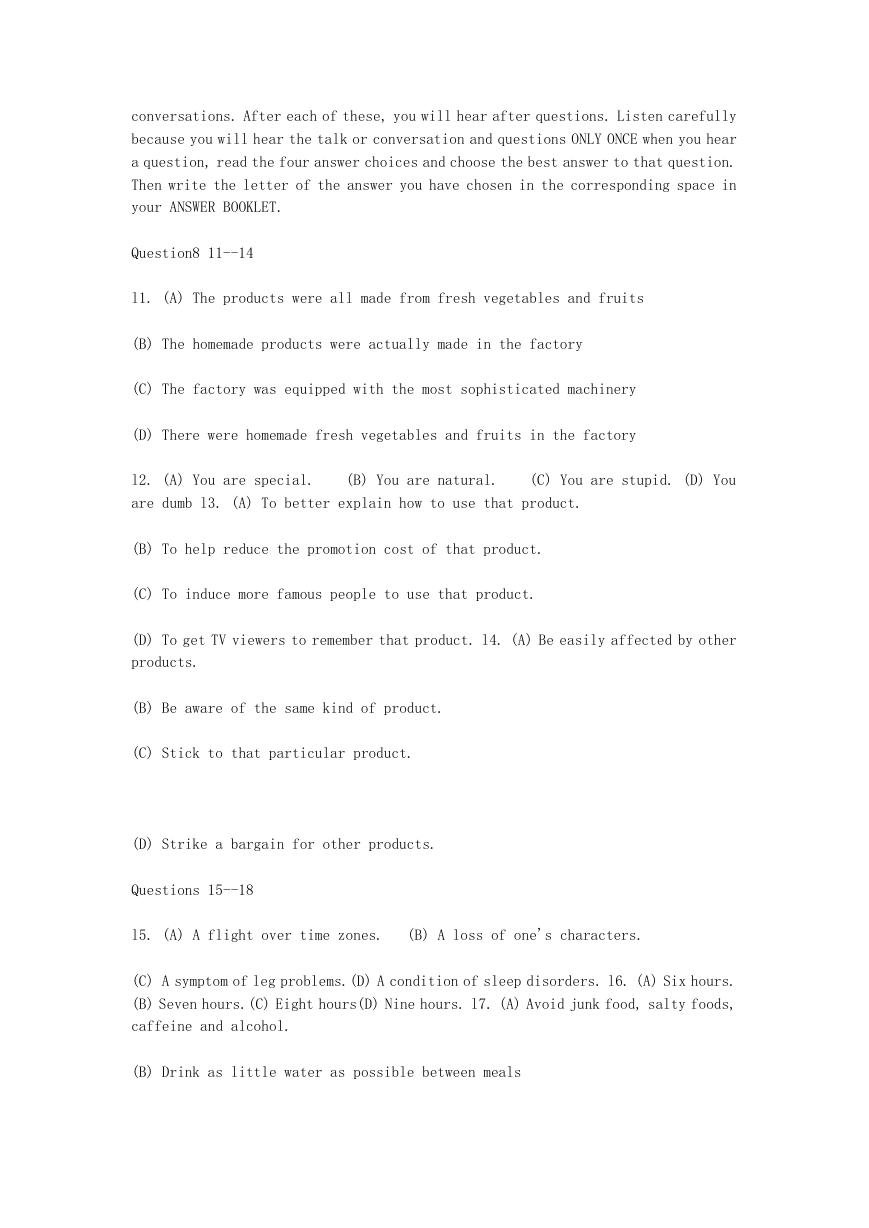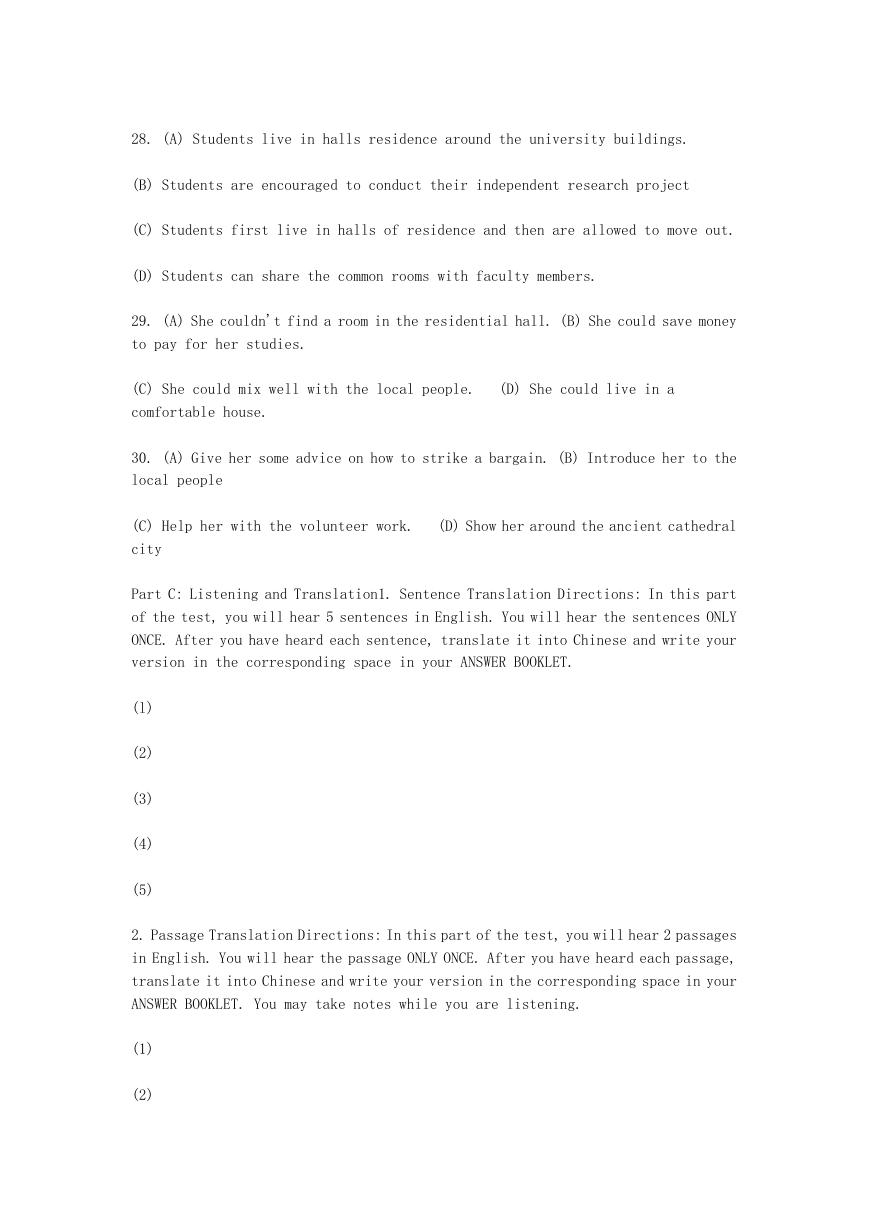2009 年 3 月翻译资格中级英语口译笔试真题
SECTION 1: LISTENING TEST(45 minute)
Part A: Spot Dictation Directions: In this part of the test, you will hear a passage
and read the same passage with blanks in it. Fill in each of the blanks with the
word or words you have heard on the tape. Write your answer in the corresponding
space in your ANSWER BOOKLET. Remember you will hear the passage ONLY ONCE. You might
think that hamburgers were invented in the United States, but that is not totally
true.
were broughtto the United
These_____(1),orpatties,actuallycamefromGermanyinthemiddleofthenineteenthcentur
y.They
Statesby_____(2)whocamefromthecityofHamburg.Thatiswhy
_____ (3)was "hamburger steak' However, people in other place_____ (4) that 'they
invented the hamburger. Perhapswe'llnever have a_____ (5).the there's no question
that the hamburger was a_____ (6). Why? Perhaps because at that time, industry was
growing and a kind of food was need _____ (7) for workers.
The hamburger became even more popular_____ (8) when the first chain of fast food
restaurants was started. This chain was called “White Castle”. It served tiny
hamburgers that were sold for only _____ (9).Then,in the 1930s there came the _____
(10) where customers were served in their cars by waiters in uniform. And the
humburger was one of the most _____ (11).By now, The hamburger was ready to_____
(12) the world. And this happened with McDonald’s, which was actually a_____ (13)
at first. But by the early 1950s the hot dog wasreplaced by the
hamburger.McDonald’sand otherfast food restaurants_____ (14) around the world
throughout the rest of the twentieth century. McDonald’s alone has_____ (15) for
everyone person in the world. The importance of the hamburger to_____ (16) remains
significant. About _____ (17)of all sandwiches that areeatenare hamburgers.
According to some sources,
_____ (18)of current workers in the United States had
their first job at McDonald’s . But the face of the hamburger is changing _____
(19). Nowadays it is possible to buy a chicken burger, a turkey burger, _____ (20),or
veggie burger.
Part B: Listening Comprehension1. Statements Directions: In this part of the test,
you will hear severalshort statements. These statements will be spoken ONLY ONCE
and you will not find them written on the paper, so you must listen carefully. When
you hear a statement, read the answer choices and decide which one is closest in
meaning to the statement you have heard .Then write the letter of the answer you
have chosen in the corresponding space in your ANSER BOOKLET.
1. (A) We were met by the head of the company at the airport.
�
(B) We haw Mrs. Jones was the president of the company,.
(C) Mrs. Jones used to be the secretary of the company
(D) Mrs. Jones came to see us off at the airport.,
2.
(A) The board of directors asked about the changes.
(B) The board 'of directors decided to invest more on the project.
(C) The board of directors approved the revisions.
(D) The board of directors could not understand her explanation.
3.
(A) Many university students prefer soft drinks to fresh fruits.
(B) Most of them are first-or-second year college students
(C) A number of college students refuse to disclose their identities
(D) Not many students are interested in our research projects.
4.
(A) We decided to sell the car when the oil Prices rose.
(B) We should not delay solving the problem of oil prices.
(C) We were at a loss as to whether to buy that expensive car or not.
(D) We didn't buy a car because of the floating oil prices.
5.
(A )Most of them are from low-income belies.
(B) Most of them are in favor of a tax cut.
(C) I know the Congress will veto the tax reform.
(D) I propose the tax reform be debated in the Congress.
6.
(A) Effective self management skills are key to academic and career success.
(B) If you spend a lot of time on your school work, you will become a good manager
later
�
(C) School work can be time-consuming and is likely to make you feel exhausted after
class.
(D) Good management calls for more time and energy on the part of the academic staff
7.
(A) Mr. Paul White has just been fired.
(B) Mr. Paul White has forgotten the woman's name.
(C) Mr. Paul White is looking for a job.
(D) Mr. Paul White has the woman Promoted.
8.
(A) I shall give you a discount
(B) The crisis is affecting the Whole world.
(C) I shall come in my Sunday best.
(D) The price is still too high.
9.
(A) He finished the negotiation in three days.
(B) He was on a business trip ten days ago.
(C) His toughness cost him three more days.
(D) His business trip lasted thirteen days.
l0. (A) We are sure that our children will become positive members of the changing
society.
(B) Children with self esteem can make positive adjustment and achieve career
success.
(C) Personal goals can be reached with the help of parents who are competent members
of the society
(D) Parents with confidence will adapt themselves to the changes and accomplish
personal goals.
2. Talks and Conversations
Directions: In this part of the test, you will hear several short talks and
�
conversations. After each of these, you will hear after questions. Listen carefully
because you will hear the talk or conversation and questions ONLY ONCE when you hear
a question, read the four answer choices and choose the best answer to that question.
Then write the letter of the answer you have chosen in the corresponding space in
your ANSWER BOOKLET.
Question8 11--14
l1. (A) The products were all made from fresh vegetables and fruits
(B) The homemade products were actually made in the factory
(C) The factory was equipped with the most sophisticated machinery
(D) There were homemade fresh vegetables and fruits in the factory
l2. (A) You are special.
are dumb l3. (A) To better explain how to use that product.
(B) You are natural.
(C) You are stupid. (D) You
(B) To help reduce the promotion cost of that product.
(C) To induce more famous people to use that product.
(D) To get TV viewers to remember that product. l4. (A) Be easily affected by other
products.
(B) Be aware of the same kind of product.
(C) Stick to that particular product.
(D) Strike a bargain for other products.
Questions 15--18
l5. (A) A flight over time zones.
(B) A loss of one's characters.
(C) A symptom of leg problems.(D) A condition of sleep disorders. l6. (A) Six hours.
(B) Seven hours.(C) Eight hours(D) Nine hours. l7. (A) Avoid junk food, salty foods,
caffeine and alcohol.
(B) Drink as little water as possible between meals
�
(C) Take drinks with less Sugar, carbonation or caffeine
(D) Always have other fluid on the plane.
l8. (A) Sleep as soon as possible. (B) Nap even during daytime.
(C) Get a good night's sleep.
(D) Relax yourself in a cafe.
Questions 19--22
l9. (A) He is overweight.(B) He is seriously ill(C) He is down with cold.
He is hale and hearty
(D)
20. (A) Two (B) Ten. (C) twenty (D) Thirty
2l. (A) It is the best (B) It is nutritious. (C) It is not enough (D) It is no healthy.
22. (A) the man is a heavy smoker
(B) The man is rather short.'
(C) The man drives a car
(D) The man works with a computer.'' Questions 23--26
23. (A) Chainman of the African Club.
(B) Chainman of the International Club.
(C) Chainman of the Irish Club. (D) Chainman of the Folk Music Club.
24. (A) Once a week (B) Once a month (C) Once a semester (D) Once a year
25. (A) The minutes of the last meeting.
(B) The treasurer's report.
(C) The Scottish and Irish Folk Dances. (D) The International Display Week.
26. (A) to help the students from the same countries overcome their homesickness
and other problems.
(B) To set up booths decorated with pictures and things of interest in the respective
countries.
(C) To recruit anyone who can sew to help make costumes so that every club member
can wear their national costume.
(D) To teach the American students Scottish and Irish folk dances during the special
even of the display. Que8tions 27--30
27. (A) In Bath(B) In London.
(C) In York (D) In the suburbs.
�
28. (A) Students live in halls residence around the university buildings.
(B) Students are encouraged to conduct their independent research project
(C) Students first live in halls of residence and then are allowed to move out.
(D) Students can share the common rooms with faculty members.
29. (A) She couldn't find a room in the residential hall. (B) She could save money
to pay for her studies.
(C) She could mix well with the local people.
comfortable house.
(D) She could live in a
30. (A) Give her some advice on how to strike a bargain. (B) Introduce her to the
local people
(C) Help her with the volunteer work.
city
(D) Show her around the ancient cathedral
Part C: Listening and Translation1. Sentence Translation Directions: In this part
of the test, you will hear 5 sentences in English. You will hear the sentences ONLY
ONCE. After you have heard each sentence, translate it into Chinese and write your
version in the corresponding space in your ANSWER BOOKLET.
(l)
(2)
(3)
(4)
(5)
2. Passage Translation Directions: In this part of the test, you will hear 2 passages
in English. You will hear the passage ONLY ONCE. After you have heard each passage,
translate it into Chinese and write your version in the corresponding space in your
ANSWER BOOKLET. You may take notes while you are listening.
(1)
(2)
�
SECTION 2: STUDY SKILLS(45 minutes)Directions: In this section, you wiIl read
several passages. Each passage is followed by several questions based on its content.
You are to choose ONE best answer, (A), (B), (C) or (D), to each question. Answer
all the questions following each passage on the basis of what is stated or implied
in that passage and write the letter of the answer you have chosen in the
corresponding space in your ANSWER BOOKLET.
Questions 1--5
I came across an old country guide the other day. It listed all the tradesmen in
each village in my part of the country, and it was impressive to see the great variety
of services which were available on one's own doorstep in the late Victorian
countryside Nowadays a superficial traveler in rural Eng1and might conclude that
the only village tradesmen still flourishing were either selling frozen food to the
inhabitants or selling antiques to visitors. Nevertheless, this would really be a
false impression. Admittedly there has been a contraction of village commerce, but
its vigor is still remarkable. Our local grocer's shop, for example, is actually
expanding in spite of the competition from supermarkets in the nearest town. Women
sensibly prefer to go there and exchange the local news whi1e doing their shopping,
instead of queueing up anonymously at a supermarket. And the proprietor knows well
that persona1 service has a substantial cash value. His Prices may be a bit higher
than those in the town, but he will deliver anything at any time. His assistants
think nothing of bicycling down the village street in their lunch hour to take a
piece of cheese to an old age pensioner who sent her order by word of mouth with
a friend who happened to be passing. The more affluent customers telephone their
shopping lists and the goods are on their doorsteps within an hour. They have only
to hint at a fancy for some commodity outside the usual stock and the grocer a
red-faced figure, instantly obtains it for them.. The village gains from this sort
of enterprise, of course. But I also find it satisfactory because a village shop
offers one of the few ways in which a modest individualist can still get along in
the world without attaching himself to the big battalions of industry or commerce.
Most of the village shopkeepers I know, at any rate, are decidedly individualist
in their ways. For example, our shoemaker is a formidable figure: a thick-set,
irritable man whom children treat with marked respect, knowing that an ill-judged
word can provoke an angry eruption at any time. He stares with contempt at the pairs
of cheap, mass-produced shoes taken to him for repair: has it come to this, he seems
to be saying, that he, a craftsman, should have to waste his skills upon such trash?
But we all know he will in fact do excellent work upon them. And he makes beautiful
shoes for those who can afford such luxury.
1.The services available in villages nowadays are normally
.
(A) fewer but still very active
�
(B) less successful than earlier but managing to survive
(C) active in providing food for the village and tourists
(D) surprisingly energetic considering the little demand for them 2.The local
grocer’s shop is expanding even though
.
(A) town shops are more attractive
(B) town shops are larger and less well-known
(C) people like to shop where they are less well-known
(D) people get extra service in town shops
3.
How do the village grocer’s assistants feel about delivering goods?
(A) They tend toforget it.
granted.
(B) They will notconsider it.
(C) They take it for
(D) It does not seem worth their while
4.
Another aspect of personal service available in the village shop is that
.
(A) there is a wide range of goos available
(B) goods not in stock can be obtained whenever they are needed
(C) special attention is given to the needs of wealthier customers
(D) goods are always restocked before they run out
5.
In what way is the village shoemaker a “formidable figure”?
(A) He seems to pay little attention to public opinion.
(B) He refuses to mend cheap, mass-produced shoes.
(C) He has a very rough temper.
�
















 2023年江西萍乡中考道德与法治真题及答案.doc
2023年江西萍乡中考道德与法治真题及答案.doc 2012年重庆南川中考生物真题及答案.doc
2012年重庆南川中考生物真题及答案.doc 2013年江西师范大学地理学综合及文艺理论基础考研真题.doc
2013年江西师范大学地理学综合及文艺理论基础考研真题.doc 2020年四川甘孜小升初语文真题及答案I卷.doc
2020年四川甘孜小升初语文真题及答案I卷.doc 2020年注册岩土工程师专业基础考试真题及答案.doc
2020年注册岩土工程师专业基础考试真题及答案.doc 2023-2024学年福建省厦门市九年级上学期数学月考试题及答案.doc
2023-2024学年福建省厦门市九年级上学期数学月考试题及答案.doc 2021-2022学年辽宁省沈阳市大东区九年级上学期语文期末试题及答案.doc
2021-2022学年辽宁省沈阳市大东区九年级上学期语文期末试题及答案.doc 2022-2023学年北京东城区初三第一学期物理期末试卷及答案.doc
2022-2023学年北京东城区初三第一学期物理期末试卷及答案.doc 2018上半年江西教师资格初中地理学科知识与教学能力真题及答案.doc
2018上半年江西教师资格初中地理学科知识与教学能力真题及答案.doc 2012年河北国家公务员申论考试真题及答案-省级.doc
2012年河北国家公务员申论考试真题及答案-省级.doc 2020-2021学年江苏省扬州市江都区邵樊片九年级上学期数学第一次质量检测试题及答案.doc
2020-2021学年江苏省扬州市江都区邵樊片九年级上学期数学第一次质量检测试题及答案.doc 2022下半年黑龙江教师资格证中学综合素质真题及答案.doc
2022下半年黑龙江教师资格证中学综合素质真题及答案.doc